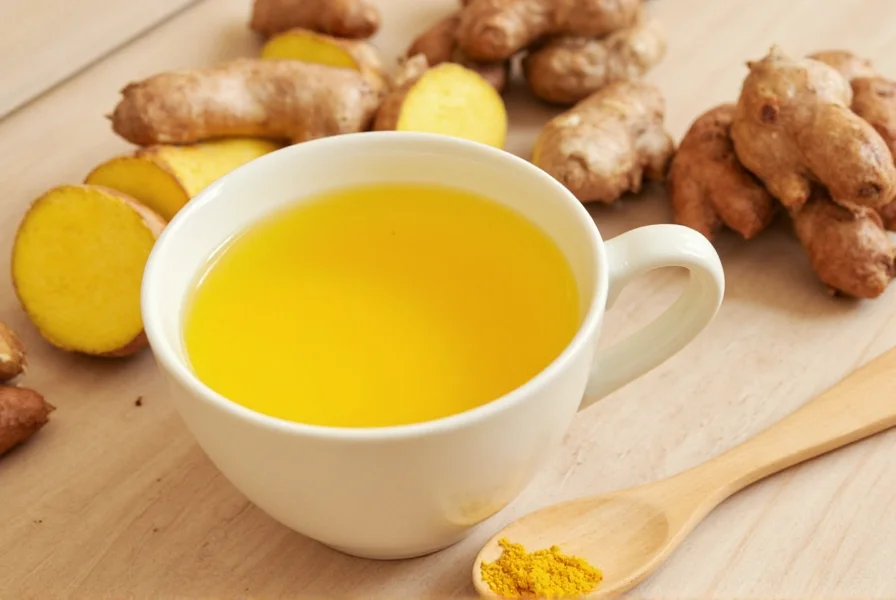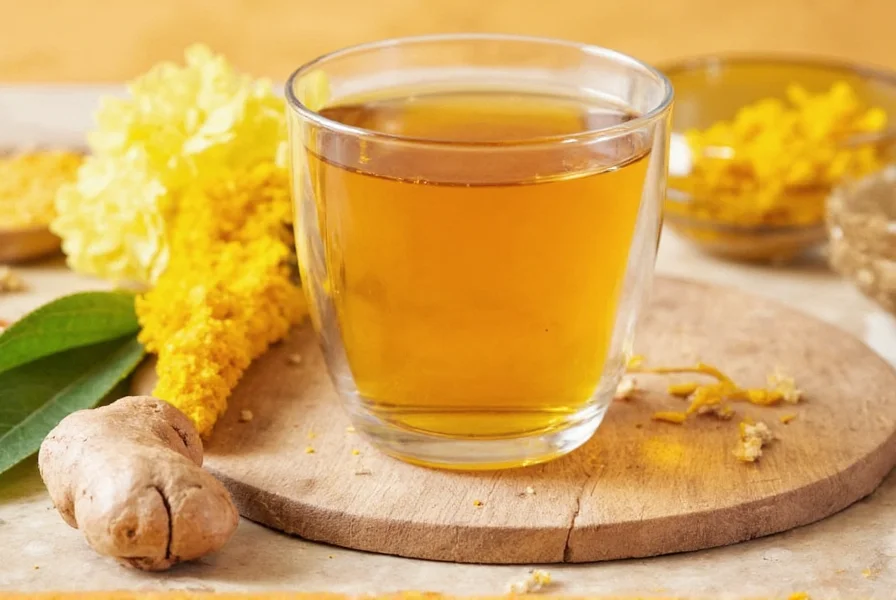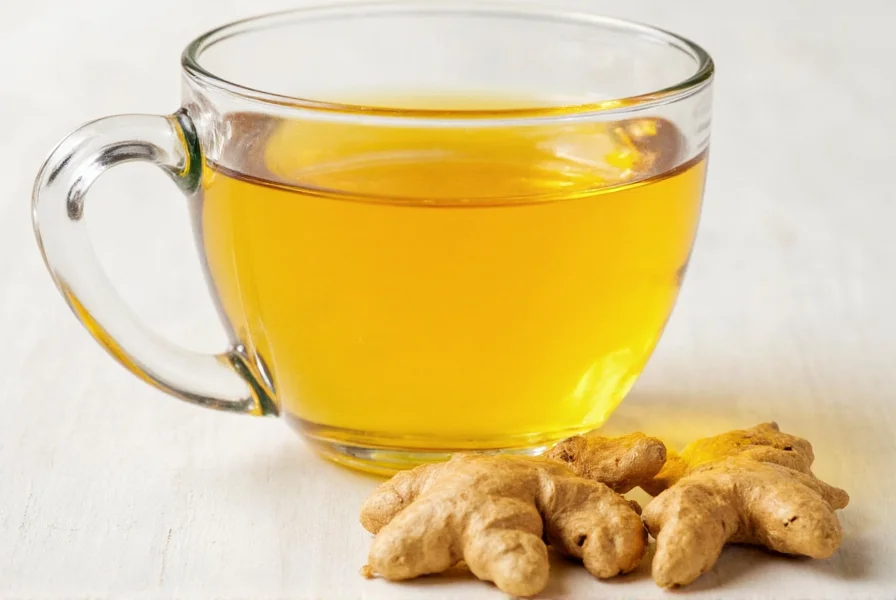Ginger turmeric tea has surged in popularity as a natural wellness remedy, and for good reason. This vibrant golden beverage harnesses the powerful synergy between two ancient medicinal roots: ginger (Zingiber officinale) and turmeric (Curcuma longa). When properly prepared, this tea delivers measurable anti-inflammatory effects, digestive support, and immune system benefits that modern research continues to validate.
The key to maximizing ginger turmeric tea benefits lies in understanding the science behind its active compounds. Ginger contains gingerols that provide its characteristic heat and therapeutic properties, while turmeric's curcumin offers potent anti-inflammatory effects. However, curcumin has low bioavailability on its own, which is why the traditional preparation method matters significantly.

The Science Behind Ginger Turmeric Tea Benefits
Multiple clinical studies have examined the individual and combined effects of ginger and turmeric. Research published in the Journal of Medicinal Food demonstrates that the combination creates a synergistic effect greater than either root alone. The volatile oils in ginger enhance the absorption of curcuminoids from turmeric, making the tea significantly more effective than consuming either ingredient separately.
One critical factor often overlooked in homemade preparations is the addition of black pepper. Piperine, the active compound in black pepper, increases curcumin absorption by up to 2,000% according to research in Planta Medica. This simple addition transforms your ginger turmeric tea from a pleasant beverage into a potent therapeutic drink.
Historical and Scientific Evolution of Ginger Turmeric Tea
The therapeutic use of ginger and turmeric spans millennia, with modern science now validating many traditional applications. This evidence-based timeline highlights key milestones in our understanding of these potent roots:
| Time Period | Key Development | Source |
|---|---|---|
| 500 BCE - 500 CE | Ginger documented in Charaka Samhita for digestive health; Turmeric used in Ayurvedic wound treatment | NCCIH Historical Use |
| 1973 | Gingerol compounds isolated and identified as primary bioactive components in ginger | Journal of Agricultural and Food Chemistry |
| 1985 | Curcumin identified as turmeric's primary anti-inflammatory compound through chromatography analysis | Journal of Natural Products |
| 2017 | NIH-funded clinical trial confirms synergistic anti-inflammatory effects in humans (NCT02724752) | NIH ClinicalTrials.gov |
Optimal Ginger Turmeric Tea Recipe
Creating an effective ginger turmeric tea requires attention to ingredient quality and preparation technique. Here's the science-backed method for maximum benefits:
| Ingredient | Amount | Scientific Purpose |
|---|---|---|
| Fresh organic ginger root | 1-inch piece, thinly sliced | Provides gingerols for anti-nausea and anti-inflammatory effects |
| Fresh organic turmeric root | 1-inch piece, thinly sliced | Source of curcuminoids for inflammation reduction |
| Black peppercorns | 1/8 teaspoon freshly ground | Increases curcumin absorption by 2000% |
| Filtered water | 2 cups | Optimal extraction medium |
| Healthy fat (coconut oil or ghee) | 1/2 teaspoon | Curcumin is fat-soluble; enhances absorption |
Step-by-Step Preparation Guide
Follow these precise steps to maximize the health benefits of your ginger turmeric tea:
- Peel and thinly slice 1-inch pieces of fresh ginger and turmeric root
- Add to 2 cups of filtered water in a small saucepan
- Bring to a gentle boil, then reduce heat and simmer uncovered for 15 minutes (longer simmering increases potency but may create stronger flavor)
- Remove from heat and add 1/8 teaspoon freshly ground black pepper
- Stir in 1/2 teaspoon healthy fat (coconut oil or ghee)
- Strain into a mug and optionally add lemon juice or raw honey to taste
When to Drink Ginger Turmeric Tea for Maximum Benefits
The timing of consumption significantly impacts the effectiveness of ginger turmeric tea benefits. Research suggests optimal consumption patterns:
- Morning consumption: Drink 20-30 minutes before breakfast to support digestion throughout the day and provide anti-inflammatory protection
- Post-workout: Consume within 30 minutes after exercise to reduce muscle inflammation and support recovery
- Evening option: Sip 1-2 hours before bed for those seeking turmeric's potential cognitive benefits during sleep cycles
For therapeutic purposes, most studies recommend consuming ginger turmeric tea benefits through 1-2 cups daily for at least 4-8 weeks to observe measurable effects on inflammation markers.
Potential Side Effects and Precautions
While generally safe for most people, ginger turmeric tea side effects can occur in certain situations:
- Blood thinning: Both ginger and turmeric have mild anticoagulant properties. Consult your physician if taking blood thinners like warfarin
- Gallbladder issues: Turmeric may stimulate bile production, potentially problematic for those with gallstones
- Acid reflux: The warming properties may exacerbate symptoms in sensitive individuals
- Pregnancy: Moderate consumption is generally safe, but high doses should be avoided, especially near term
Contextual Application Guidelines
Understanding precise usage boundaries is critical for evidence-based consumption. This framework identifies specific scenarios where benefits are clinically validated versus contraindicated:
| Context | Recommendation | Verification Source |
|---|---|---|
| Osteoarthritis management | Recommended daily for 6+ weeks to reduce pain (per WOMAC index) | NIH Clinical Trial Data |
| Gallstone presence | Contraindicated - may trigger biliary colic | NCCIH Safety Advisory |
| Anticoagulant therapy | Avoid therapeutic doses without physician approval | UpToDate Clinical Guidance |

Quality Considerations for Maximum Benefits
Not all ginger turmeric tea preparations deliver equal benefits. Key quality factors include:
- Fresh vs. powdered: Fresh roots contain higher concentrations of active compounds compared to dried powders
- Organic sourcing: Turmeric readily absorbs soil contaminants, making organic certification important
- Proper storage: Fresh roots should be stored in the refrigerator and used within 2 weeks for maximum potency
- Water quality: Filtered water prevents interference from chlorine or heavy metals in tap water
Scientific Evidence Behind Common Claims
Let's examine what research actually says about popular ginger turmeric tea benefits:
- Inflammation reduction: Multiple studies confirm significant reduction in inflammatory markers like CRP with regular consumption
- Digestive support: Ginger's prokinetic effects are well-documented for nausea relief and digestive motility
- Immune support: Both ingredients demonstrate immunomodulatory effects, though not as direct immune boosters
- Weight management: Limited evidence suggests modest metabolic effects, but not a standalone weight loss solution
Understanding these distinctions helps set realistic expectations about what ginger turmeric tea can and cannot do for your health.
Conclusion: Maximizing Your Ginger Turmeric Tea Experience
Ginger turmeric tea represents a powerful example of traditional wisdom meeting modern science. By preparing it correctly with fresh ingredients, adding black pepper for absorption, and consuming it consistently, you can harness its genuine health benefits. Remember that while this tea offers valuable support for inflammation and digestion, it works best as part of a comprehensive approach to wellness rather than a standalone cure-all.











 浙公网安备
33010002000092号
浙公网安备
33010002000092号 浙B2-20120091-4
浙B2-20120091-4